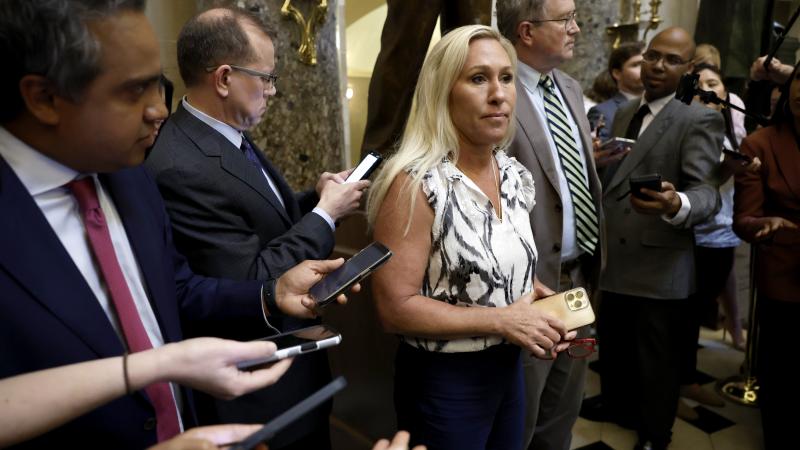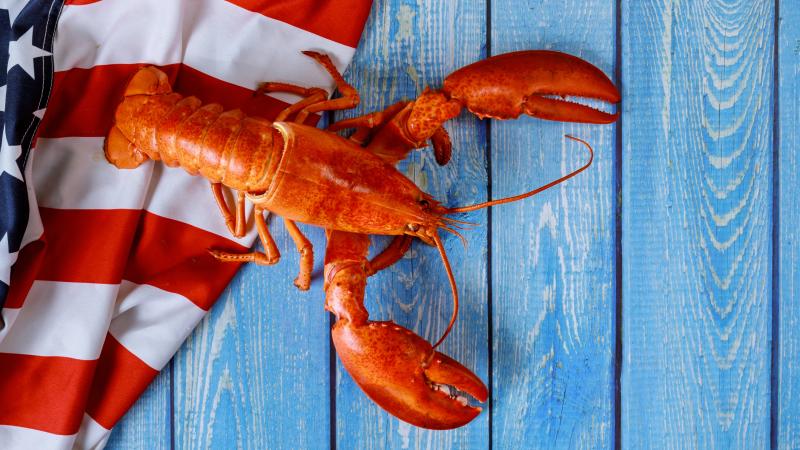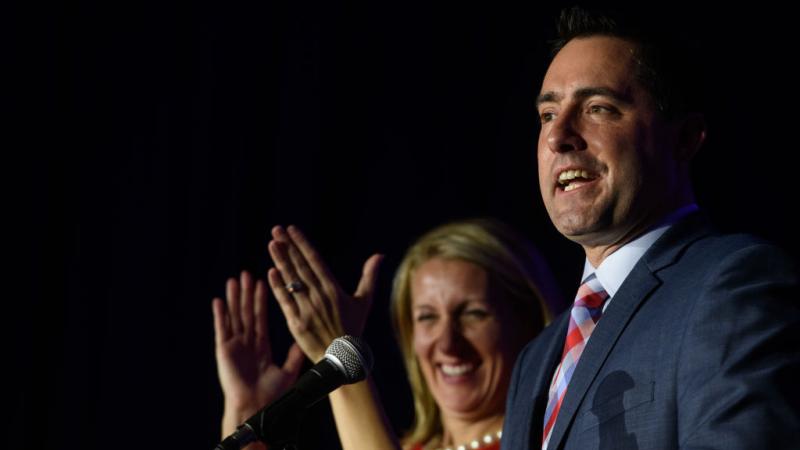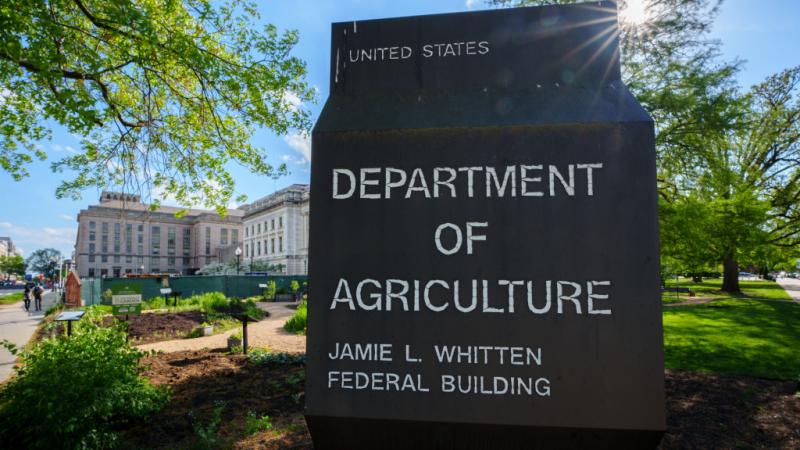House Speaker Johnson faces his next big test with farm bill spending, food stamps
The Farm Bill is a multi-year spending package that covers an array of programs across twelve titles. It may turn out to be another challenge to Speaker Johnson's tenure.
An upcoming debate on a major farm bill package could present one of the last pre-election chances for House Speaker Mike Johnson to pursue substantive spending cuts and placate some of his conservative detractors.
Johnson has faced considerable flak from budget hawks in recent months over his support for a $1.2 trillion “minibus” spending package and a $95 billion foreign aid supplemental to send funds to Ukraine, Israel, and Taiwan. The Republican speaker even faced the threat of potential ouster from Georgia GOP Rep. Marjorie Taylor Greene, who first filed a motion to vacate Johnson in March, though the House overwhelmingly tabled that motion this week.
The Farm Bill faces an end-of-year deadline to avoid the expiration of a number of critical programs such as food stamps and a Republican-led version of the legislation is slated for markup later this month. Traditionally, a sizeable, multi-year expenditure, it remains unclear whether Johnson will move to limit or reduce spending in the bill, though some House lawmakers have already called for such measures.
What is the Farm Bill?
The Farm Bill is a multi-year spending package that covers an array of programs across twelve titles. While the measure funds many agriculture programs addressing exports, farmland management, forestry management, renewable energy development, and crop insurance, the largest component of the bill by far addresses nutrition assistance.
The Supplemental Nutrition Assistance Program (SNAP), better known as Food Stamps, is easily the largest component of Title IV of the bill, though that section also includes support for the Commodity Supplemental Food Program (CSFP) and The Emergency Food Assistance Program (TEFAP).
The last Farm Bill was passed in 2018 and is set to expire at the end of Fiscal Year 2024, after which many of the bill’s components will expire if Congress does not renew it in time. SNAP benefits, like many entitlements, have long been on the conservative chopping block and a potential reduction of the program, or of the Farm Bill more broadly, could theoretically serve to placate that contingent of the Republican conference.
By the numbers
A typical Farm Bill comes with both five and ten-year budget projections, according to the Congressional Research Service. They also authorize both mandatory and discretionary spending, though the mandatory component makes up the lion’s share of each bill.
The 2018 Farm Bill’s 10-year outlay for budget stood at $867.2 billion, of which the Nutrition component, including SNAP benefits, accounted for $663.8 billion, according to the Congressional Research Service.
The Congressional Budget Office, moreover, creates a baseline figure for the purposes of policy making that assumes the continuation of all programs under current law. As of February of this year, the 10-mandatory outlay baseline for Fiscal Year 2025 through Fiscal Year 2034 stood at $1.4 trillion, an increase of roughly 62% overall. Of that, the Nutrition component accounted for $1.147 trillion, an increase of nearly 73%.
The frustrations of budget hawks
With the baseline projection such a substantial increase, a renewal plan will almost certainly lead to efforts from conservatives to rein in additional spending or even cut the programs to some extent. Indeed, at least one member of the Freedom Caucus has also suggested alterations to the SNAP process.
“So you got the farm bill coming and about 86% of that will go to fund the SNAP program, which is food stamps. So that's a normal deal, but we're advocating that they break it up because, you know, SNAP is abused,” Arizona GOP Rep. Andy Biggs, a member of the conservative Freedom Caucus, said on the “Just the News, No Noise” television show last month.
He further outlined conservative frustrations with Johnson and indicated that “there's a lot of discontent. And then some of us feel far deeper than discontent. There's a lot of anger as well and frustration.”
In April of this year, Greene circulated a letter to her Republican colleagues detailed her grievances with Johnson’s leadership and taking particular aim at the spending package.
"Speaker Johnson's omnibus did nothing to stop Biden's deadly border invasion—it fully funded it," she said. "It did nothing to stop the energy-killing Green New Deal climate agenda—it fully funded it. It did nothing to stop the weaponized DOJ and FBI—it fully funded it. It did nothing to stop the trans agenda on kids—it fully funded it. It did nothing to stop abortion—it fully funded FULL-TERM abortion clinics, and so much more."
"This has been a complete and total surrender to, if not complete and total lockstep with, the Democrats’ agenda that has angered our Republican base so much and given them very little reason to vote for a Republican House majority,” she continued.
Competing proposals
Neither House Republicans nor Senate Democrats have released their full plans for the bill, though both parties have unveiled general outlines of their visions, which have highlighted competing priorities for the two chambers of Congress.
House Agricultural Committee Chairman Glenn "GT" Thompson, R-Penn., released a Republican-led overview of the bill, indicating that he planned to mark up the full bill on May 23.
"This bill is a product of an extensive and transparent process, which included soliciting feedback from members of both political parties, stakeholder input from across the nation, and some tough conversations,” he said in a press release. “Each title of this farm bill reflects a commitment to the American farmer and viable pathways to funding those commitments, and is equally responsive to the politics of the 118th Congress. The Committee on Agriculture will markup this bill on May 23, and I hope for unanimous support in this endeavor to bring stability to producers, protect our nation’s food security, and revitalize rural America."
Senate Agricultural Committee Chairwoman Debbie Stabenow, D-Mich., meanwhile, unveiled the Democratic overview.
“This is a serious proposal that reflects bipartisan priorities to keep farmers farming, families fed, and rural communities strong,” she said at the time. “The foundation of every successful Farm Bill is built on holding together the broad, bipartisan coalition of farmers, rural communities, nutrition and hunger advocates, researchers, conservationists, and the climate community.”
“This is that bill, and I welcome my Republican colleagues to take it seriously and rejoin us at the negotiating table so we can finish our work by the end of the year. Farmers, families, and rural communities cannot wait any longer on the 2024 Farm Bill,” she continued.
Points of disagreement
A key point of the Republican-led overview was the reallocation of existing funds for conservation from the Inflation Reduction Act, a $740 billion spending package that also included funding for dozens of environmental and green energy programs. The Republican plan, the overview declared, "[p]rovides historic investment in Title II by reallocating IRA conservation dollars and expands covered conservation practices."
It also aims to reverse Biden-imposed increases to food aid and to further limit presidential authority to increase SNAP benefits. Such a move, Republicans say, will stop "egregious Executive branch overreach and disallows future unelected bureaucrats from arbitrarily increasing or decimating SNAP benefits."
"We don’t take money out of the nutrition title to fund another part of the bill, which has never been done," Stabenow said, rejecting the Republican proposals, according to The Hill.
Republicans estimate their actions would ultimately save $300 billion over the years and insist they don't want to cut SNAP, though the outlet suggested that the proposed freezes would amount to a de facto $30 billion cut to the program over 10 years.
The Democratic proposal, meanwhile, drew criticism from upper chamber Republicans over spending on partisan initiatives, including Sen. Tommy Tuberville, R-Ala., who told Just the News that Stabenow's measure "only includes Democrats' priorities."
"The proposal does not put our farmers, foresters, and producers first - it prioritizes spending on nutrition and conservation instead of farm programs," he continued. "Democrats have been saying for months that there's no additional money to bolster the farm safety net with necessary increases in reference prices and crop insurance protections. Yet, somehow they found more than $20 billion to spend on their partisan priorities, including allowing Puerto Rico residents to be eligible for SNAP and tying conservation spending to climate change initiatives."
Reactions
Agriculture Secretary Tom Vilsack reacted positively to Stabenow’s initial outline, saying “I think it’s well thought out. I think it’s a practical approach,” according to Brownfield AG News. "I mean, we’re living in a constrained environment. It has to be doable. It has to be affordable and I think she has been able to do that."
His attitude toward the Republican outline, meanwhile, was somewhat lukewarm. Vilsack said that it “really didn’t tell me much at all.”
“I would hope that [Thompson] would learn there’s no appetite for reductions in the SNAP program,” he added. “I would hope that he understands that there’s little appetite for taking the conservation money and repurposing it.”
Vilsack’s attitude towards cuts and financing of the plan will likely place the executive branch and Senate Democrats on a collision course with the Republicans, who have suggested that funding the Farm Bill will likely require significant budget offsets.
“While there is some common ground, the framework released by Sen. Stabenow doesn’t appear to include GOP input or reflect the highest priorities we have heard loud and clear from American farmers. Meeting these priorities will require offsets well beyond the limited amount the senator’s release alluded to,” Thompson told the Fence Post of the Democratic plan.
"I appreciate the work of Chairman GT Thompson in the House Ag Committee to put together a solid farm bill framework with essential support for southern commodities," Tuberville said. "While these two proposals each take a starkly different approach to farm bill reauthorization, I am glad that we are starting the conversation. Food security is national security, and it's important that our farm bill prioritizes those who work hard to feed, fuel, and clothe Americans. I look forward to continuing to advocate for the needs of Alabama's farmers and producers throughout this process."
Just the News sought comment from Mike Johnson, who did not respond by presstime.
Ben Whedon is an editor and reporter for Just the News. Follow him on X.















